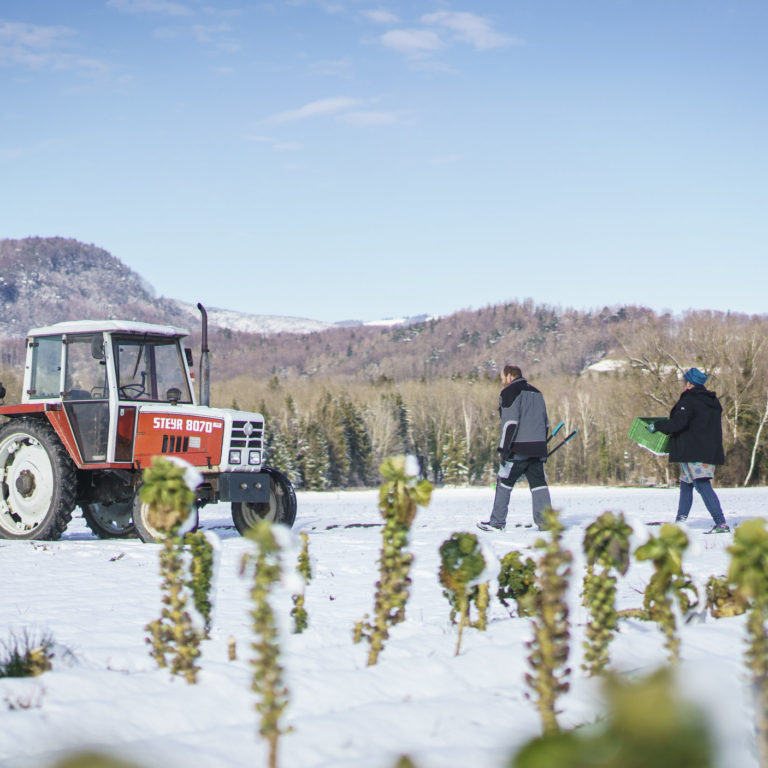
C Gruenkohl Ernte Lisilis Biohof © Dietmar Denger / Vorarlberg Tourismus
With hand and heart
Agriculture in winter – visiting Lisilis organic farm in Meiningen

C Gruenkohl Ernte Lisilis Biohof © Dietmar Denger / Vorarlberg Tourismus
Agriculture in winter – visiting Lisilis organic farm in Meiningen
Bodensee-Vorarlberg
For almost 30 years, Karl Kühne and his wife Brigitte have been farming organically out of conviction – working without pesticides, allowing the animals to move more freely and sustainably managing the soil. This means more manual work, also during winter
TEXT: ANNE SCHÜSSLER
It’s early. It’s still dark in Meiningen. But the proprietors of Lisilis organic farm, the Kühne family, are already up and about. The pigs, chickens and cows are still dozing in the stables, their breath hangs in the still air and the fields and the farm are cloaked in white frost. Karl and his son Michael are feeding the animals. “They’re always first,” says Karl.
There are now more than 20 cows but there were only six in the beginning. “My father ran a small conventional dairy business here,” says Karl. He and his wife took over the farm in Meiningen, which is eight kilometres north of Feldkirch, and switched completely to organic farming 29 years ago.“The decisive factor for my parents was the high nitrogen content in the groundwater at the time,” explains son Michael, who now works as an organic farming consultant in Vorarlberg. “We didn’t want to be farmers who poisoned their own drinking water.” The Kühne family won the Landwirtschaftlicher Zukunftspreis (Agricultural Future Prize) in 2015 for their organic farming methods and careful soil management.
Michael, who is 28 years old, and his three adult siblings regularly help out on their parents’ farm. Because there’s still a lot to do in spite of the frost and snow. “Even in winter, we’re still harvesting vegetables and have to clean them and get them ready for selling,” says Karl. Leek, Brussels sprouts, parsnips and other root vegetables are now growing in the fields around the farm. The vegetables and many home-made products are sold in the family’s own farm shop. Some of the region’s hotels and restaurants also source their organic supplies from the family. Customers can even get milk outside business hours from the milk filling station. It’s also where eggs from the family’s chickens are sold. The chickens live in mobile coops, called ‘chicken mobiles’, which are moved around the farm.
We want to make visitors more aware of our sustainable way of living.
A few helpers join the family once a week to pack vegetable boxes. “Customers are able to order the boxes with vegetables of the season from us and have them delivered to their homes on fixed days of the week,” Michael explains.
The family also enjoys the help of young people on practical training schemes and ‘Wwoofers’ – people from all over the world who volunteer to work on organic farms. That way, the family is able to provide valuable insights to interested people. “We think it’s important to explain to people how we work,” Karl says. He and his wife also use their free time to meet with farmers all over the world and swap ideas with them. They’ve just returned from Vietnam. The family has also installed many colourfully illustrated signs for children that explain the work on their own farm. Visitors are able to read at different points about what work needs to be done there and how the animals contribute to farm life. “School classes often come to visit us,” Karl says proudly. The kids can also get involved.
He and his wife also use their free time to meet with farmers all over the world and swap ideas with them.
Karl and Michael now have to get back to work. They’re just loading the last vegetable box into the car. Numbers have increased recently – a good sign for the family and their organic farm.